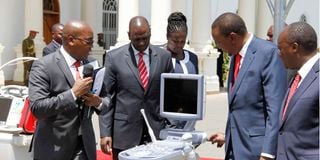Premium
Medical kits grind to a halt as contract ended

Then-Deputy President William Ruto (second left) and his boss Uhuru Kenyatta (second right) during the signing of the MES contracts at State House on February 6, 2015. President Ruto wants the contracts terminated.
Machines under the Managed Equipment Services (MES) scheme in 125 hospitals have ground to a halt due to lack of maintenance, even as the government considers terminating the contracts.
It means thousands of people seeking services that require dialysis machines, ultrasound, intensive care unit (ICU), incinerators, sterilising units with surgical sets and assorted cancer gadgets are missing treatment.
Just days ago, the government notified contractors of the termination of the service – and the taking over of the leased equipment as per the contract signed before the machines were taken to at least two hospitals in the country’s 47 counties.
The fully-fledged low-cost diagnostic centres, screening and treatment facilities were established in 98 hospitals – two per county – before the addition of others in the middle of the contract – to enable people with chronic illnesses easily access services and decongest national referral hospitals.
Since the inception of the project to December 2021, about 628,821 Kenyans have been attended to, according to Ministry of Health data seen by the Sunday Nation.
Some 385,587 received dialysis, with 7,472 getting ICU services.
About 1.8 million Kenyans have accessed ultrasound services, X-ray (3.9 million), Mammogram (40,840), Orthopantomagram or X-ray of the jaws (91,083) with a C-Arm machine attending to 19,866 individuals.
Governors now say Kenyans will miss critical services when the contracts are terminated.
“The country is staring at a crisis, with services in more than 125 hospitals grinding to a halt due to lack of maintenance of the equipment occasioned by the expiry of MES contracts,” Council of Governors chairperson Anne Waiguru said.
“We call on the Ministry of Health to urgently extend the contracts or find an alternative to this glaring matter.”
Council Health Committee chairman, Muthomi Njuki, said terminating the contract would hit patients hard as they are used to the services and kits.
“If the MES is phased out, we need a solution. Health services should not take a break,” the Tharaka Nithi governor said.
“We are not bothered by what equipment provides the service, but the service itself.”
Mr Njuki added that it is heartbreaking to witness the MES contracts coming to an end when the number of those in need of the services is rising.
“We will let our people down and may even lose some. This is one of the worst times for patients. Some are not getting services because of machine breakdowns. We want the contracts extended or an alternative found urgently,” the county boss said.
The government has resolved to purchase the controversial MES upon termination of the contracts.
“The procuring entity shall at its option be entitled to purchase the equipment (including any early works equipment) by service of written notice by the Principal Secretary to the contractor’s representative at a nominal value of $1 upon the expiry of this contract in accordance with its terms, including payment of the money due,” Health Principal Secretary Peter Tum told the contractors in a May 5 letter.
Mr Tum has since been transferred to the Ministry of Youth Affairs, Arts and Sports in the same capacity.
“The ministry commits to payment of money due and payable, including payment for services rendered outside the contract period up to July 31, subject to provision of verified claims and invoices for payment as well as proof of the services rendered prior to the transfer of the equipment,” the letter adds.
Through the documents and exchange of confidential emails at Afya House, the government is already in a conversation about bringing in new hospital kits.
There is also a plan for an internal tender advertisement immediately the contracts expire in July.
“The contractors will have to bid afresh to participate in the procurement of the services. If they come to be winners, they will continue giving service until such a time the equipment will be obsolete,” Mr Tum said in an earlier interview.
The MES debacle has already seen Senate Speaker Amason Kingi order the Committee on Health to reinvestigate the status of the multibillion-shilling programme.
Meanwhile, contractors in the initial deal fear the plan is to lock them out.
“Even with the new bidding structure, we may not get the contract as we are not aware of the terms. They may even be way below the cost of servicing and maintaining the machines,” said a contractor who ruled out going to court.
The contracts with Mindray’s Biomedical of China ended on December 2, 2022 while India’s Esteem was over on the last day of last year.
The one of Philips from the Netherlands ended on April 1, 2023, General Electric of the US (April 8), with Italy’s Bellco SRLs ending on Thursday next week.
The suppliers were responsible for installing the equipment at county hospitals and ensuring they worked optimally.
They were to train personnel, technicians and biomedical engineers on how to handle the kits.
The government was left with the responsibility of paying for services rendered.
After contractors received termination letters, many said they are not sure the government will settle the servicing fee.
“You cannot fire me and expect me to continue working. I may want to deliver but there is no motivation,” one said.





